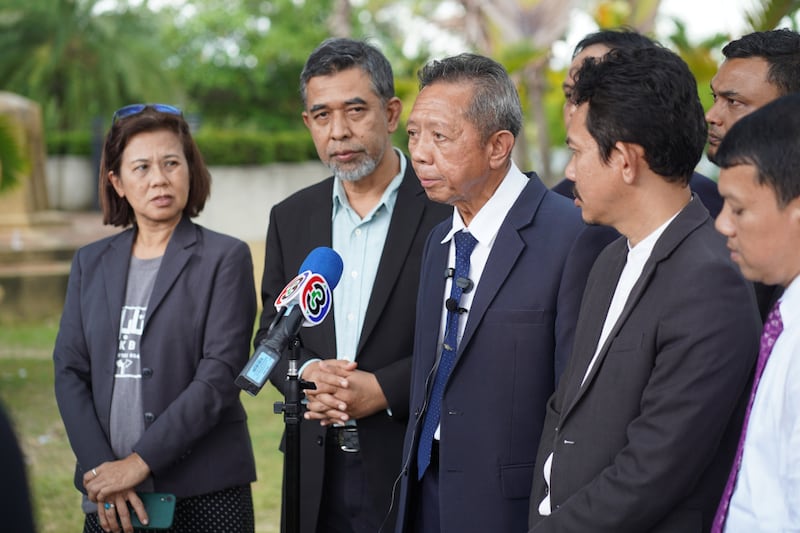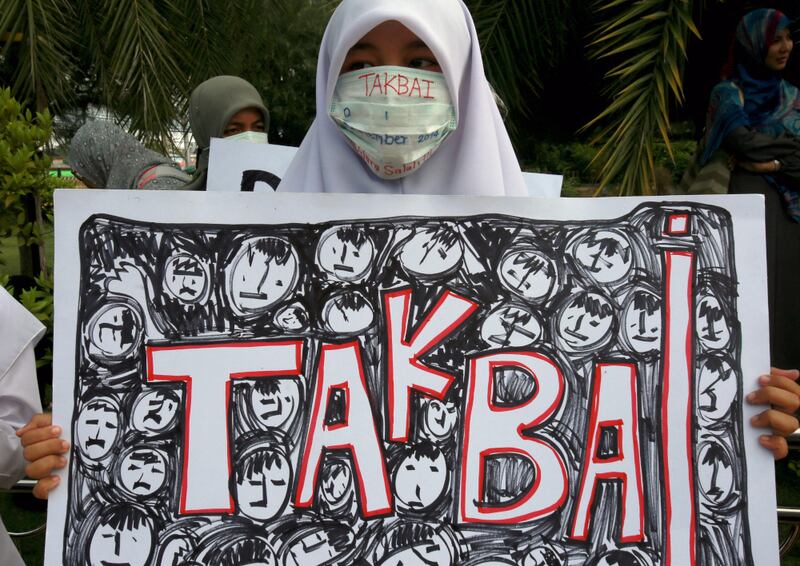Seven former officials including senior military and police officers are to stand trial over the deaths of 85 Muslim protesters in the so-called Tak Bai Massacre of October 2004, after a court in Thailand’s southern border region agreed Friday to take up the unprecedented case.
The Narathiwat Provincial Court ordered the defendants to appear on Sept. 28 to face trial in the case filed in April by 48 relatives of protesters killed or injured during the infamous incident, which happened the year that a separatist insurgency reignited in the region.
The court, which began conducting a preliminary hearing on June 24, ruled that the case should proceed against the defendants but it dismissed charges against two others.
The seven defendants include Gen. Pisarn Wattanawongkiri, 74, a former commander of the 4th Army Region who is now a member of parliament for the ruling Pheu Thai Party, and Gen. Sinchai Nusatit, 76, a former commander of the 5th Infantry Division.
“The criminal case, filed by the victims’ families and the injured from the Tak Bai incident against state officials involved in the Oct. 25, 2004, crackdown, has been accepted by the court on charges including collective murder, attempted murder and unlawful detention,” the court’s statement read.
The Tak Bai Massacre remains one of the most notorious incidents in the ongoing conflict because most of those who were killed had suffocated to death in the backs of trucks where they were bound and stacked up like logs while being transported to a military camp.
The lawsuit was accepted just 63 days before the statute of limitations would have expired, according to lawyers representing the plaintiffs.
“This case is historic because it’s the first time high-ranking state officials will enter the justice system for a protest crackdown case,” Pornpen Khongkachonkiet, director of the Cross-Cultural Foundation, told BenarNews.

Fareedah Toh-leh, 72, who lost her son in the 2004 incident, explained the motivation behind the lawsuit.
“We decided to file the lawsuit because we want to know if there is any justice left in Thailand. We also want the defendants to admit that what they did was wrong,” she told BenarNews.
SEVEN DEFENDANTS
- Gen. Pisarn Wattanawongkiri, 74, former 4th Army Region commander, currently a party-list MP for Pheu Thai Party
- Lt. Gen. Sinchai Nusatit, 76, former commander of the 5th Infantry Division
- Police Gen. Wongkot Maneerin, 73, former director of the Royal Thai Police's Forward Command
- Police Lt. Gen. Manoch Kraiwong, 77, former commander of Provincial Police Region 9
- Police Maj. Gen. Suksommai Puttakul, 70, former chief of Tak Bai district police station
- Siwa Saengmanee, 78, former deputy director of the Southern Border Provinces Peace-building Command
- Wichom Thongsong, 78, former governor of Narathiwat province
The incident unfolded in 2004, when protesters gathered at the local police station in Tak Bai, a district of Narathiwat, to demand the release of six village security volunteers.
The situation escalated as authorities dispersed the crowd, resulting in seven deaths. And in a tragic turn of events, 78 suffocated to death in the back of trucks after being rounded up. Many others were injured, disabled or went missing in the aftermath.
In 2009, a court ruled that the deaths occurred during lawful operations by officials. An appeal by victims' families in 2012 was dismissed, leaving no officials held responsible for the deaths.
However, in 2013, the government approved compensation totaling 641.45 million baht (U.S. $18.9 million) for the Tak Bai survivors.
RELATED STORIES
[ 2 decades on, families of Tak Bai Incident victims seek justiceOpens in new window ]
[ Two decades on from a watershed year, peace still eludes Thailand’s Deep SouthOpens in new window ]
[ Victims Cannot Forget Tak Bai Tragedy in ThailandOpens in new window ]
The case has drawn attention to the long-standing conflict in Thailand’s Deep South, a Muslim-majority and mainly Malay-speaking region near the Malaysia border that encompasses the provinces of Pattani, Yala, Narathiwat and four districts of Songkhla province. Over 7,000 people have been killed since 2004 in insurgency-related violence, according to the Deep South Watch, a local think-tank.
Abdulqahar Awaeputeh, director of the Muslim Attorney Center, noted the significance of the upcoming hearing.
“If the defendants appear in court on Sept. 12 and testify, it will be considered a new start for the statute of limitations. But if they don’t show up, arrest warrants must be issued,” he said.

He said if they failed to appear and were not picked up on arrest warrants, the 20-year statute of limitations could expire on Oct. 25, meaning prosecutors would not be able to proceed with the case.
“We want all relevant individuals, both defendants and agencies, to facilitate justice in this case by cooperating with the court on Sept. 12. This will help Thai society move toward becoming a society where the law is enforced equally without discrimination,” Pornpen said.
The acceptance of this case marks a potential turning point in Thailand’s approach to accountability for violence involving government officials. Previous incidents, including crackdowns in 1973 and 1976 and protest dispersals in 2010, have not resulted in trails against high-ranking officials.
“This case will be the first door leading Thailand toward ending the culture of impunity for state officials,” Pornpen said.
